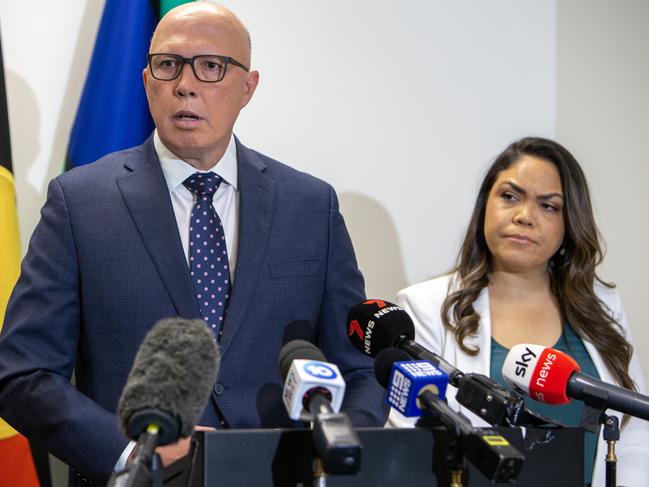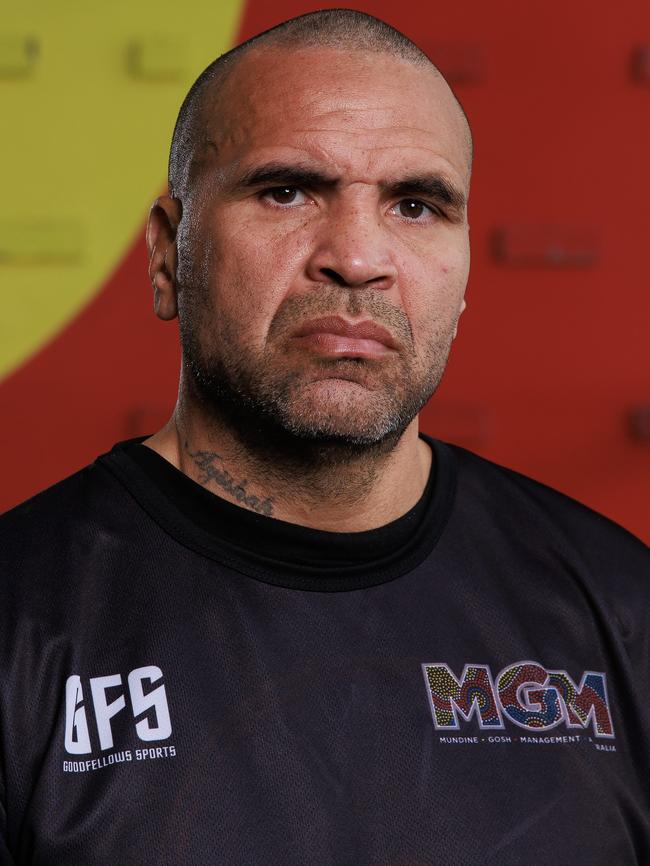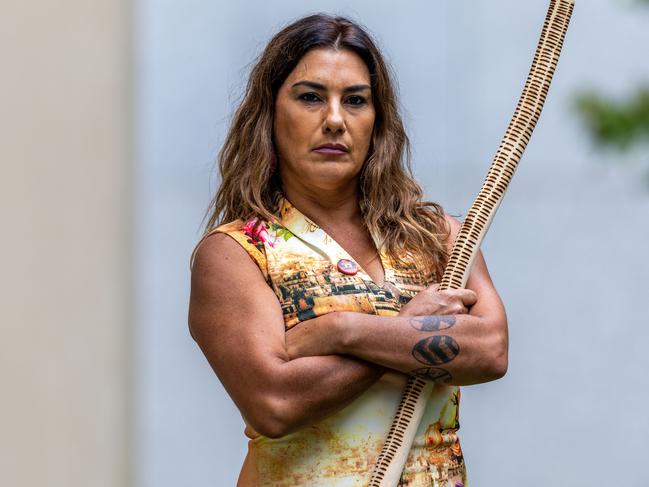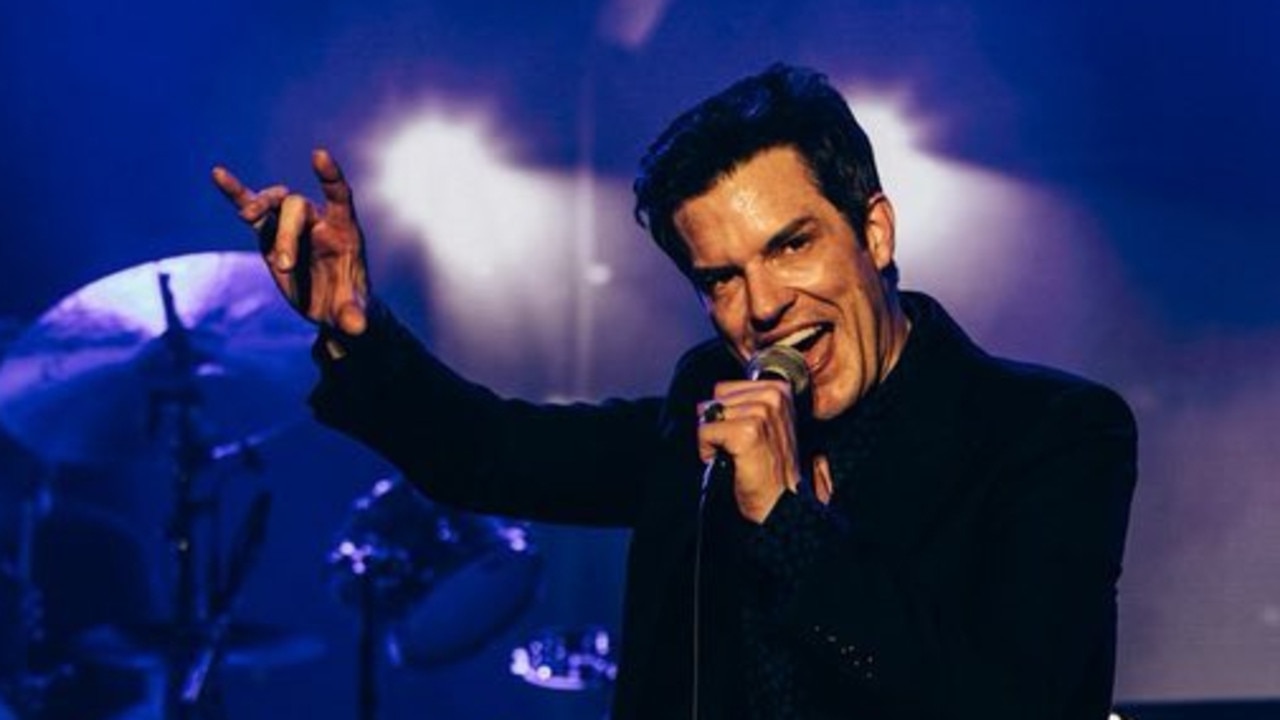Voice referendum: Everything you need to know about No campaign
Millions of Australians will decide on October 14 whether to amend the Constitution to formally recognise Indigenous peoples. Here is everything you need to know about the No campaign.

National
Don't miss out on the headlines from National. Followed categories will be added to My News.
The No case argues Australians should vote against the Voice to Parliament because there is not enough detail and it goes much further than simple recognition of Indigenous Australians in our constitution.
While No proponents agree we should be doing more to help First Nations people in disadvantaged communities, they believe the Voice is legally risky with too many unknowns and that it would permanently divide our nation into different classes of citizens.
However, even within the No camp, there are differing views on why the Voice won’t work.
The Coalition say it risks leaving us with a permanently flawed government, though a handful of its federal MPs do not support the party’s position.
Other groups campaigning against it include Fair Australia, led by Opposition Indigenous Australians spokeswoman Jacinta Nampijinpa Price (says it’s divisive), conservative lobby group Advance (says it has no power) and the Recognise a Better Way committee (says it will negatively affect democracy).
Here’s a summary of the various arguments being posed against the Voice.
IT’S UNCLEAR WHAT IT WILL DO
Proponents of the No case, including Mr Dutton, say Australians are being asked to vote on the biggest change to our democracy in Australia’s history without knowing what it will do, how it will work or how its members would be chosen.
In July, the Minister for Indigenous Australians Linda Burney said the Voice would be asked to consider four main priority areas on day one: health, education, jobs and housing.
But critics want to know what would happen if the Voice proposed scrapping Australia Day or pushed back against future government policy in a range of areas.
Constitutional law experts have said that whatever the parameters set by government, the Voice could end up making representations on any number of subjects that affect the lives of Indigenous Australians.
Commentators have pointed out that the same-sex marriage postal plebiscite of 2017 was a simple proposition that most Australians could understand, whereas the Voice is a more open-ended and complex proposal.

IT’S DIVISIVE
One criticism of the Voice, articulated by groups including Recognise a Better Way and the Rule of Law Education Centre, is that the Voice will enshrine the idea of racial difference in the constitution, by offering Indigenous people an extra say on issues that affect everyone.
Recognise a Better Way (now part of Australians for Unity) states on its website: The Voice will “establish a shadow government, with its own advice apparatuses to make demands of government and the parliament not available to any other constituency”.
Former Prime Minister Tony Abbott has also taken up this line, arguing the constitution “belongs to all of us”.
“I don’t see why any particular group of Australians, however much they might be respected, should have their own special voice to the government into the parliament over and above the Voice that every other Australian gets,” Mr Abbott said.
IT’S TOO MUCH POWER
The constitutional amendment voters are being asked to approve or reject states that the Voice will “make representations to the Parliament and the Executive Government”. Some people who are otherwise supportive of the concept of the Voice say having a direct line to the executive, not just the parliament, will give it too much power.
“No issue is beyond its scope,” the official No case pamphlet warns.
Critics have also suggested the wording as it currently stands would, in effect, pass power to the High Court, as it would be left to determine what the constitutional amendment actually allows, and what it doesn’t.
“The risk of legal appeals and delays means the risk of dysfunctional government,” the No pamphlet argues.


IT WILL BE EXPENSIVE
While Yes campaigners say the Voice will lead to the more cost-efficient allocation of government services, the No side asserts the Voice to Parliament will be another layer of bureaucracy that will cost taxpayers a lot of money.
The costs are a big unknown, as the details of the Voice – how many members it will have, how often it would meet, where it would meet, and how many staff would be required to ensure it runs smoothly – are yet to be worked out.
The government already allocates $4.3 billion for the National Indigenous Australians Agency, which has 1400 staff, the No case campaigners point out in the official pamphlet.
A TREATY SHOULD COME FIRST
While some oppose the Voice on the basis that it will entrench too much power in the new body, others believe it will actually rob Indigenous people of power.
Senator Thorpe opposes the Voice on this basis, saying it’s just an “advisory body” and has “no power”. For her, and others who think the same way, a Treaty between Indigenous Australians and the settlers who came later should be prioritised over the creation of a Voice.
“We are sick of tinkering around the edges, we have been advisers for too long. We want better,” Senator Thorpe previously said.

IT SHOULD BE LEGISLATED, NOT CONSTITUTIONAL
Some opponents say they are happy with the idea of a Voice to Parliament – they just don’t want it enshrined in the Constitution, as that sets up something that can only wound back by another referendum.
“Mechanisms (laws) to improve standards should be temporary and terminated when goals (ie Closing the Gap) have been achieved,” the Rule of Law Education Centre says.
A legislated body, on the other hand, could be dissolved by a simple majority vote in parliament.
Recognise A Better Way has proposed a three-point plan in lieu of creating a Voice: recognising Australia’s first inhabitants in a preamble to the constitution, establishing a cross-party standing committee for native title holders in our federal parliament, and providing support for Aboriginal organisations.
IT OPENS THE DOOR TO MORE CHANGES
No case campaigners have suggested the Voice will inevitably call for other big-ticket changes to Australia – such as a new date for Australia Day, the look of the flag, reparations for past historical wrongs against Indigenous communities, and even the question of whether we should become a republic.
Yes campaigners have largely rejected speculation about the issues the Voice might consider and make representations over, but it comes at a time when Australia is discussing some of these difficult questions more than ever before.
No campaigners seized on remarks made by Thomas Mayo from the Referendum Working Group that the Voice is a “first step” and that reparations and compensation could follow as a clear indication that the Voice would, in their words, “open the door for activists”.
More Coverage
Originally published as Voice referendum: Everything you need to know about No campaign





